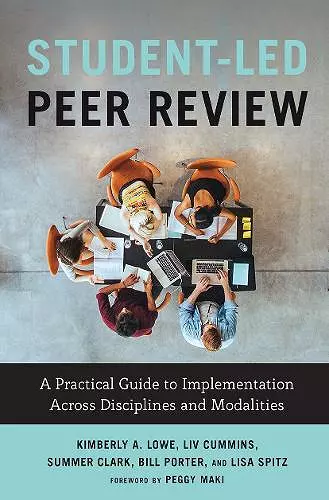Student-Led Peer Review
A Practical Guide to Implementation Across Disciplines and Modalities
Bill Porter author Summer Ray Clark author Liv Cummins author Lisa Spitz author Kimberly A Lowe author
Format:Paperback
Publisher:Taylor & Francis Inc
Published:4th Oct '22
Currently unavailable, and unfortunately no date known when it will be back
This paperback is available in another edition too:
- Hardback£145.00(9781642673081)

Student-led peer review can be a powerful learning experience for both giver and receiver, developing evaluative judgment, critical thinking, and collaborative skills that are highly transferable across disciplines and professions. Its success depends on purposeful planning and scaffolding to promote student ownership of the process. With intentional and consistent implementation, peer review can engage students in course content and promote deep learning, while also increasing the efficiency and effectiveness of faculty assessment.Based on the authors’ extensive experience and research, this book provides a practical introduction to the key principles, steps, and strategies to implement student peer review – sometimes referred to as “peer critique” or “workshopping”. It addresses common challenges that faculty and students encounter. The authors offer an easy-to-follow and rigorously tested three-part protocol to use before, during, and after a peer review session, and advice on adapting each step to individual courses.The process is applicable across all disciplines, content types, and modalities, face-to-face and online, synchronous and asynchronous. Instructors can guide students in peer review in one course, across two or more courses that are team-taught, or across programs or curriculums. When instructors, students, and university stakeholders create a culture of peer review, it enhances learning benefits for students and allows faculty to share pedagogical resources.Student peer review is a high-impact pedagogy that’s easily implemented, inculcates lifelong learning skills in students, and relieves the assessment burden on faculty as students collaborate to improve their own work.
“Distinguished by its depth and breadth of coverage, Student-Led Peer Review: A Practical Guide for Online and F2F College Courses takes a deep exploratory dive into the range of factors faculty need to address to effectively design and implement student-led formative review processes that are educationally beneficial both to peer reviewers themselves and to fellow students who receive those reviews in face-to-face and online courses. Drawing on research on peer-led review, on faculty and student criticisms of or reluctance to engage in peer-led review processes, and on authors’ own IRB-approved research on designing, integrating and conducting cross-disciplinary research on peer led reviews, Lowe, Cummins, Clark, Porter, and Spitz have developed a much needed exemplary practical guide to the principles, strategies, and steps that underlie the design, integration, and preparation of students to engage effectively in peer-led reviews.
I laud Lowe, Cummins, Clark, Porter, and Spitz’s comprehensive exploration of what it realistically takes to support and promote a commitment to peer review that, in turn, leads to students’ development of enduring capabilities. To those who may aim to write about the design and implementation of other educational practices, let this practical guide serve as an exemplary model: it is grounded in research; it recognizes the range of challenges those who implement a practice need to address both in teaching and learning; it identifies specific strategies and steps to addresses those challenges—particularly for our student demographics and the contexts within which they learn; and it identifies strategies to build a longitudinal and shared commitment to students’ attainment of the desired outcomes of a practice. Bravo, Authors.”
From the Foreword, Peggy L. Maki
"This book offers a research-based, practitioner-focused approach to using peer review in the classroom. The authors do a masterful job of anticipating the challenges of student peer review and describing the considerable benefits that accrue when students are asked to take responsibility, think critically and gain agency. The book is an excellent resource for teachers, as it provides strong rationale for encouraging peer review and compelling ideas for designing instruction and environments that foster student growth in this vital area. Highly recommended!"
Peter Afflerbach, University of Maryland
ISBN: 9781642673098
Dimensions: unknown
Weight: 231g
152 pages